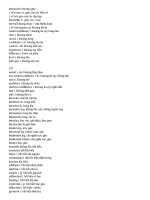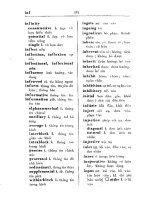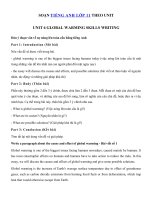Individual essay to toan phuong anh aen T321WSB 6 21000883
Bạn đang xem bản rút gọn của tài liệu. Xem và tải ngay bản đầy đủ của tài liệu tại đây (120.84 KB, 7 trang )
ASSIGNMENT COVER SHEET
STUDENT DETAILS
Student
name:
Tơ Tồn Phương Anh
UNIT AND TUTORIAL DETAILS
Unit
name:
Academic English
Tutorial/Lectur
e:
Lecturer or Tutor
name:
Gabriel Ryan
Student ID
number:
21000883
Unit
number:
Aen-T321WSB-6
Class day and time:
ASSIGNMENT DETAILS
Title:
Length
:
Individual Essay
Due
date:
Date
submitted:
DECLARATION
I hold a copy of this assignment if the original is lost or damaged.
I hereby certify that no part of this assignment or product has been copied from any
other student’s work or from any other source except where due acknowledgement
is made in the assignment.
I hereby certify that no part of this assignment or product has been submitted
by me in another (previous or current) assessment, except where appropriately
referenced, and with prior permission from the Lecturer / Tutor / Unit
Coordinator for this unit.
No part of the assignment/product has been written/ produced for me by any
other person except where collaboration has been authorised by the Lecturer /
Tutor /Unit Coordinator concerned.
I am aware that this work may be reproduced and submitted to plagiarism detection
software programs for the purpose of detecting possible plagiarism (which may
retain a copy on its database for future plagiarism checking).
Student’s
signature:
Note: An examiner or lecturer / tutor has the right to not mark this assignment if the
above declaration has not been signed.
In today's recruitment market, large and small businesses both want to recruit the best and best
employees that help their companies grow stronger day by day. The working environment is
becoming more complicated and challenging, demanding employees' ability to adjust and cope
with unexpected bad situations. The companies are looking for individuals with not only
experience or some specific skills, but also can work productively to stay long-term. According
to Tulgan, the most common recruiting mistake that causes employers a great deal of frustration
and disappointment is focusing too much on hard skills and not enough on soft skills. It is
evidence that soft skills are as much important, or can even be more essential than hard skills in
the workplace. However, soft skills are often overlooked and underestimated as an insignificant
factor in the working environment, especially in schools. During their education, students are not
well-trained in these essential soft skills that are required for them to work after graduation. This
essay will discuss some reasons why students nowadays are lacking these essential soft skills,
and why more focus on these skills should be implemented in schools. Finally, some feasible
solutions are suggested to help students overcome the lack of soft skills in higher education.
Firstly, it is a fact that most schools, nowadays, focus solely on teaching students to master the
compulsory subjects and develop the abilities for learning new knowledge. Because many
schools believe that foundational and technical knowledge is critical for students to develop and
maintain a healthy and independent lifestyle, both in and out of school. However, according to
Schulz, soft skills are the essential factor in developing individual personalities, which also help
them learn new skills required for the jobs later on. Therefore, the education system should place
as much importance on soft skills as it does on hard skills. Another factor contributing to the lack
of soft skills in students is the fact that students are less likely to be interested in studying and
improving their soft skills. As they do not recognize the value of soft skills earlier during their
school days, which, unfortunately, will become increasingly important later in their future
workplace. Without a doubt, more and more employers are complaining about hiring new
graduates with a good educational background but lacking essential soft skills, due to the shortsightedness of today's education system. Therefore, soft skills increasingly become a vital
requirement for success in many professions (Taylor, 2016). Nevertheless, students must acquire
and improve both hard and soft skills before being able to enter the job market. There is no
denying that the importance of academic knowledge in students' experiences, however, schools
should also provide the opportunity for students to gain and develop soft skills during their
school years.
To increase the chances of success in future careers, soft skills play an important role in helping
students. Soft skills are skills such as teamwork, communication, or leadership, etc.… showing
individual abilities to work effectively in different types of working environments. On the other
hand, hard skills demonstrate expertise and mastery in specific fields, which can be measured
using standardized tests or examinations. According to Knasnis et al., soft skills are becoming
more and more important in almost every job that enables individuals to work, interact with
people in meaningful ways, and progress within an organization. Without a doubt, most careers
need collaboration, and it is critical for individuals to develop these essential soft skills to boost
their employability and land their dream careers. Moreover, to advance in careers and to reach
more job opportunities, people can try to include soft skills on their resume, introduce and
emphasize these skills during the interview and keep improving them when working. Individuals
with strong soft skills are much more beneficial for companies because those with these skills
can help the companies in many ways, such as growing a wide network or developing strong
leadership. In other words, people with good soft skills acquired an inquisitive mindset, which
helps them explore more professional opportunities and quickly gain industry expertise to
advance further in their careers. Employers are always looking for employees with a strong
professional network to assist them in making business connections, providing professional
development, and even making smart recruiting choices. Furthermore, people with strong soft
skills can assess what type of leadership techniques their team needs to succeed and then execute
these techniques depending on the real-life situation (Indeed Editorial Team, 2021).
Due to the fact that employers continue to complain about students lack of soft skills, yet there
are some reasonable solutions towards this problem. Participating in extracurricular activities at
school is one of the most efficient ways to gain soft skills. Students may rapidly strengthen soft
skills, such as communication, teamwork, problem solving, and so on, by interacting with other
students in a variety of activities at these events. Another solution is that schools should allow
students to choose between learning soft skills and hard skills based on their specialties. By
doing this, students who are planning to study on jobs which require contacts with customers can
prioritize more on studying soft skills and those who are planning to study on jobs that do not
need too much communication can focus on studying hard skills. As a result, students are able to
learn what they want while simultaneously improving skills that they will need in the future. For
further improvement on soft skills, students need to learn from books, online courses or
volunteer activities. For example, according to Ko and Rossen, they define and detail many
exercises for boosting student engagement as well as soft skills in their book "Teaching Online:
A Practical Guide". Moreover, they recommended using scenarios and case studies to encourage
analysis and problem-based learning in response to a specific difficulty. Additionally, in
University of Florida course Nutritional Management of Nursery Crops, they give students a
description of the problem and its symptoms, as well as any data they need to address it, such as
soil or water analysis. So that students are more capable to solve problems and adapt to
unpredictable situations. In short, not only can schools help students cope with the shortage of
soft skills in higher education but also students can enhance soft skills on their own.
To put it in a nutshell, it is a fact that the work environment is increasingly competitive and
harsher, and soft skills are essential for adapting to this. Many schools, however, believe that soft
skills are not as important as other subjects and are not worth investing in. As a result, to assist
students in their future careers, schools must take steps such as making the necessary soft skills a
mandatory subject and encouraging students to enroll in extracurricular or volunteer activities.
Even though soft skills are difficult to define and develop in a short time, schools should provide
opportunities for students to learn soft skills early on in order to gain valuable experience for
future careers. Students will have more opportunities to apply for well-paying jobs and achieve
success in the future. Last but not least, in some certain jobs people seem to underappreciate the
importance of soft skills, however, soft skills are expected to be an indispensable part to the
success.
References
10 Reasons Why Soft Skills are Important to Employers. (2021, May 25). Indeed Career Guide.
/>Khasnis, Y. (2020). “Soft skills are attributes …. Engage in meaningful interactions” Introduction.
International Journal of Creative Research Thoughts, 8(Volume 8, Issue 5), 2320–28820.
http://111.93.251.158/jspui/bitstream/123456789/3701/1/7_2020.pdf
Ko, S., & Rossen, S. (2017). Teaching online: A practical guide. Routledge.
Schulz, B. (2008). The Importance of Soft Skills: Education beyond academic knowledge. In
NAWA Journal of Language and Communication.
/>%20%20Skills-Education%20beyond%20academic%20knowledge.pdf
Tulgan, B. (2015). Bridging the Soft Skills Gap: How to Teach the Missing Basics to Todays Young
Talent. In Google Books. John Wiley & Sons.
/>Taylor, E. (2016). Investigating the perception of stakeholders on soft skills development of
students: Evidence from South Africa. Interdisciplinary journal of e-skills and lifelong
learning, 12(1), 1-18.









